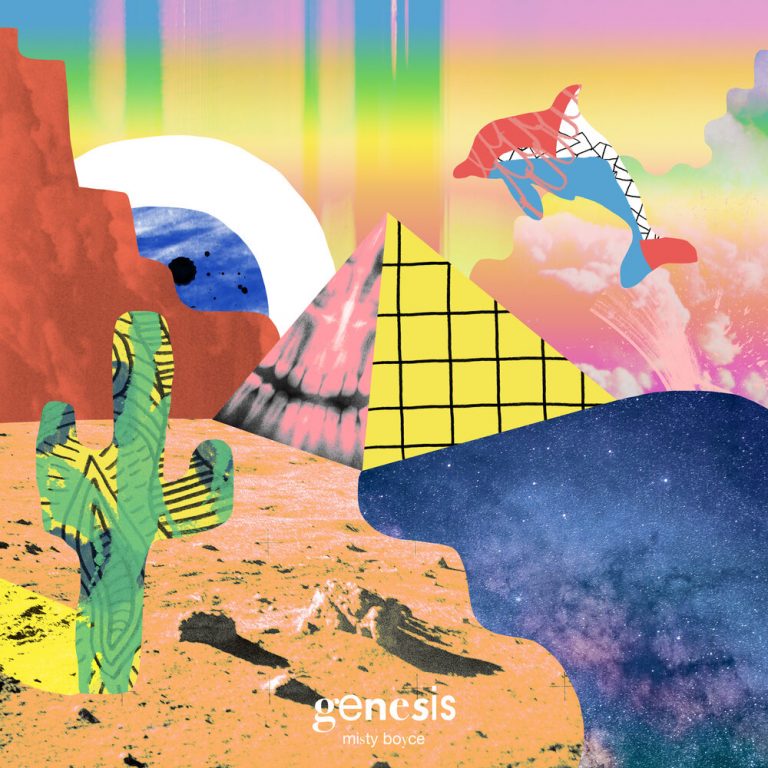Misty Boyce might be known amongst her peers and the music industry as a reliable and bookable session player, but she has been carving out her own take on the world for more than half a decade now. She’s worked with the likes of Sting, Ingrid Michaelson, and BØRNS., and she knows the value of teamwork when it comes to making the music sound right – an ethos that has followed her solo work from the beginning.
On her new album, genesis, the LA songwriter brings in a hearty mix of players contributing the likes of brass, wind, and percussion across a brief but dreamily exploratory landscape. Producer Jon Joseph has Boyce sounding freer, looser, and more at ease with herself and her surroundings – and all this despite the contentious heart of the album. Exploring the role of women in society and how their stories are left in the background, Boyce examines her life and her religious upbringing, and how this has attracted so much oppression and toxicity from the beginning.
As the title suggests, genesis looks to restart and for rebirth. On “bros” she asks “when will the bros of Hollywood be over?”, pushing the fact that women’s stories and roles are too often left aside for the sake of another tale of another dude. Over a hazy, relaxed backdrop her tone is scathing but suitably patronizing as she sings to a group that needs taken down more than a few pegs. “Don’t look down / Fucking own it / C’mon bro,” she urges smoothly but like she’s also biting her tongue. Meanwhile on “charades” she calls out inaction: “But talk ain’t worth a lot if you won’t change,” she patiently states before a punchy brass accompaniment arrives in the final minute to back her up. She’s tired of excuses and playing games, as you might infer from the song’s title.
“genesis (n)one” is where the fusion of religious imagery and prejudice culture against women comes together most clearly. Punctuated by scratchy guitar chords and a forthright delivery, the song recasts the story of Adam and Eve to show how blame is shifted so easily. Taylor Goldsmith (of DAWES), as Adam, makes for a strong match, but it’s Boyce who hooks in the listener right from the beginning. Even though the verse might be catchier than the chorus, “genesis (n)one” still shines and is the best track the album has to offer.
If genesis is anything, then it’s an exploratory – if not experimental – album. Boyce takes time to pause and take in her surroundings, as well as veer into extended moments away from words. “i do” spends half of its runtime with Boyce exploring her keyboard with post-jazz flourishes, like she’s detailing the landscape in a nighttime drive. Even “genesis (n)one”, the most consumable moment here, takes a pause in the middle to venture into spaced-out territory, like all the gravity has been turned off and the world has gone into slow motion.
Even when there’s a clear direction, genesis is still full of sounds to find, from the scratchy descending guitar strings on “8 days a week”, which sound like they are coming from a sewer, to the staccato, step by step synth on opening track “control (lose)”, where Boyce sounds like she’s treading on eggshells. The production is always lush and busy, but the songwriting often lacks strong sticking power, like on “story of skin” (despite all its shiny chords) or the first half of “i do”. “luv u always” goes by all-too-quickly on hurried piano chords, like it’s rushing out the door; the Fiona Apple-like trickle of notes are a nice sonic feature, but it feels like the track would have been stronger if it matched the surroundings and if Boyce slowed it down and explored the space between the chords.
Ultimately, this is an album where an assured and confident songwriter is taking apart structure, not afraid to wander and explore so as to evoke or find the right mood or feeling. There’s a personal spine to the album, and while listeners might not be able to grasp on easily throughout, you can tell it’s a record Boyce needed to make for herself. This is something she admits too: “Honestly this feels like the record I’ve been wanting to make my whole career, ‘cause it combines all of my favorite things.” But, this is Boyce at her easiest to consume; her work has never sounded this fun or carefree – just look at that colourful, inviting artwork. It’s almost like she’s rewriting the story. If so, then this isn’t a bad place to begin again.

